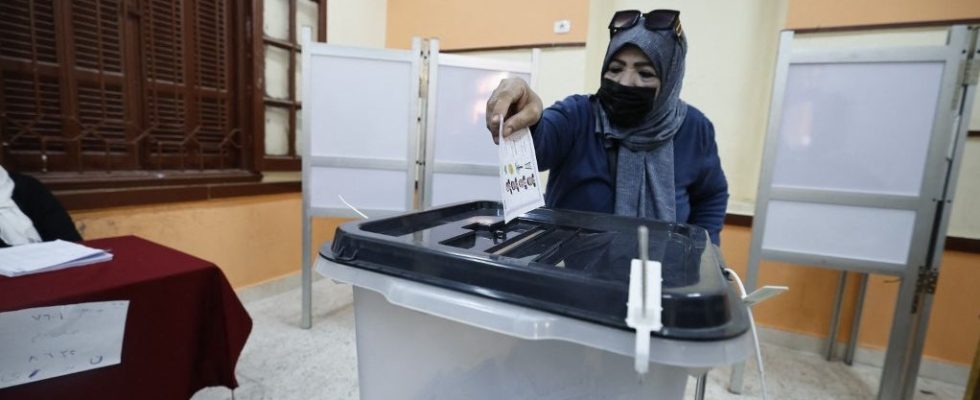Egyptians began voting this Sunday for a presidential election largely overshadowed by the war in the neighboring Gaza Strip and unsurprisingly, the outgoing Abdel-Fattah al-Sissi seemed assured of winning a third term. In the country of 106 million inhabitants facing the most serious economic crisis in its history, purchasing power is the priority, with two thirds of the population living below or just above the poverty line. Some 67 million voters are expected to vote this Sunday, Monday and Tuesday from 7:00 a.m. to 7:00 p.m. (Paris time) before the official results on December 18.
Apart from the outgoing president, three candidates generally unknown to the general public are in the running: Farid Zahran, at the head of the Egyptian Democratic and Social Party (left), Abdel-Sanad Yamama, from the Wafd, a century-old but now marginal party, and Hazem Omar, of the Republican People’s Party. Despite Egypt’s difficulties, no serious opposition seems to exist under the reign of Abdel-Fattah al-Sissi, the fifth president from the ranks of the army since 1962, who rules the country with an iron fist.
Media taken to power
Thousands of opponents were imprisoned, and if the presidential pardons committee released a thousand in one year, “three times as many people” were arrested during the same period, according to NGOs. Far from exciting the crowds, the presidential campaign took place in November in the shadow of the war between Israel and Palestinian Hamas, which monopolizes the attention of the media and public opinion.
Talk shows, close to the intelligence services and fervent supporters of President Sissi, are now trying to link the two. “There are two million (Gazans) who want to return home (…), we cannot sit and watch, we are going to go out and say ‘no to the transfer’” of the Palestinians, argues presenter Ahmad Moussa , repeating word for word a speech by Abdel-Fattah al-Sissi at the start of the war. Two opposition figures tried to present themselves for a time but were quickly dismissed. Today, one of them is in prison and the other awaiting trial.
Participation will be closely scrutinized
Journalist and activist Khaled Dawood denounces “a stifling atmosphere of suppression of freedoms, total control of the media, and security services which prevent the opposition from taking action in the streets”. “We have no illusions: the vote will be (…) neither credible nor fair,” he wrote on Facebook. But he will vote for Farid Zahran, in order to “send a clear message to the regime”: “We want change”, because “after ten years, the living conditions of Egyptians have deteriorated and we risk bankruptcy because of ( his politics. »
In the presidential elections of 2014 and 2018, former Marshal Sissi, who came to power in 2013 by overthrowing the Islamist Mohamed Morsi, won with more than 96% of the votes. He has since extended the length of the presidential term from four to six years and amended the Constitution to extend the limit from two to three consecutive presidential terms. In this context, eyes will turn towards participation. In the last presidential election, it reached 41.5%, or six points less than in the previous election.

